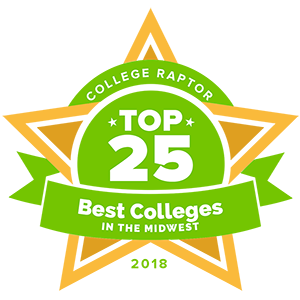 America’s heartland has a lot to offer: friendly people, prosperous industries, and a host of amazing colleges. Despite being labeled as “fly-over states” the Midwest is home to a number of prominent academic institutions. Here’s our list for the best colleges in the Midwest.
America’s heartland has a lot to offer: friendly people, prosperous industries, and a host of amazing colleges. Despite being labeled as “fly-over states” the Midwest is home to a number of prominent academic institutions. Here’s our list for the best colleges in the Midwest.
For the purposes of the list, we’ve included the following states: IA, IL, ID, KS, MI, MN, MO, NE, ND, OH, SD, WI.
25. Rose-Hulman Institute of Technology
- Location: Terre Haute, IN
-
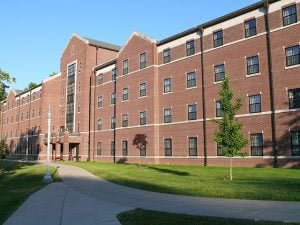
Wikimedia Commons user cjeiler
Student Enrollment: 2,354
- College Type: Private not-for-profit, 4-year or above
The small private college, previously known as Rose Polytechnic Institute at the time of its founding in 1874, specializes in engineering, mathematics and science. Appropriately, the top undergraduate majors at RHIT are Mechanical Engineering, Chemical Engineering, Electrical Engineering and Computer Science.
-
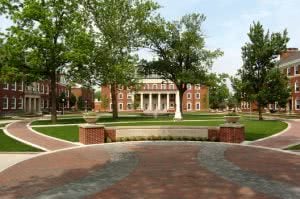
Wikimedia Commons user Rovergirl88
Location: Greencastle, IN
- Student Enrollment: 2,265
- College Type: Private not-for-profit, 4-year or above
Originally known as Indiana Asbury University, DePauw is a member of the Great Lakes College Association and is affiliated with the Methodist Episcopal Church. It was renamed in honor of Washington DePauw, a donor who established the university’s School of Music. The school’s 21 athletic teams compete in black and gold and are cheered on by their mascot, Tyler the Tiger.
-
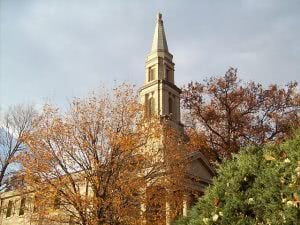
Flickr user Don Kasak
Location: Elsah, IL
- Student Enrollment: 460
- College Type: Private not-for-profit, 4-year or above
Principia was founded in 1912 by Mary Kimball Morgan “to serve the Cause of Christian Science.” However, the university no longer has an official association with the Christian Science Church. Currently, the school offers 27 majors, the most popular of which are Business Administration, Mass Communication, Creative Writing and Education.
22. Illinois Wesleyan University
-
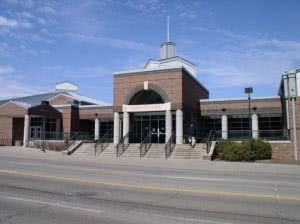
Wikimedia Commons user republicofjosh01
Location: Bloomington, IL
- Student Enrollment: 1,842
- College Type: Private not-for-profit, 4-year or above
Illinois Wesleyan was founded in 1850 by a group of 30 civic and religious leaders affiliated with the Methodist Church. Its founding mission is to foster the traditional liberal arts of creativity, character and knowledge. Today, the university offers 80 majors, minors and programs the most popular of which are Business, Psychology, and Biology.
-

Flickr user VasenkaPhotography
Flickr user VasenkaPhotographyLocation: East Lansing, MI
- Student Enrollment: 50,538
- College Type: Public, 4-year or above
Founded as an agricultural school in 1855, Michigan State served as a model for land-grant universities formed under the Morrill Act of 1862 before it expanded its offerings beyond agriculture. More recently, MSU has pioneered in educational fields such as hospitality business, supply chain management and communication sciences.
20. Indiana University–Bloomington
-
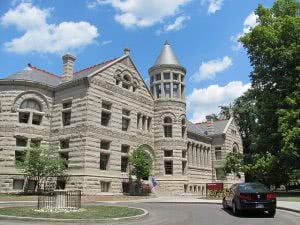
Wikimedia Commons user MARELBU
Location: Bloomington, IN
- Student Enrollment: 48,514
- College Type: Public, 4-year or above
IU is the flagship institution of the Indiana university system, and is its largest school. The university also offers an extensive student life program, offering over 750 student groups on campus. The student body is also very diverse, with origins in all 50 states as well as 165 foreign countries.
-
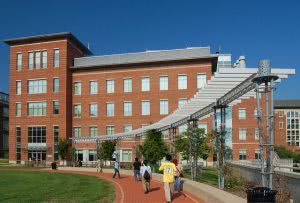
Flickr user Adrian MB
Flickr user Adrian MBLocation: Granville, OH
- Student Enrollment: 2,254
- College Type: Private, not-for-profit, 4-year or above
Denison University students come from all 50 states and 37 countries. From time to time, biology and geology classes are held at the biological reserve just east of its campus. Popular majors include Biology, Communications, Economics, Psychology, History and English. The school’s nickname is appropriately Big Red since its school colors are red and white.
18. Case Western Reserve University
-
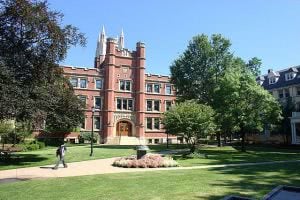
Wikimedia Commons user Rdikeman
Location: Cleveland, OH
- Student Enrollment: 11,340
- College Type: Private not-for-profit, 4-year or above
Located five miles east of downtown Cleveland, Case Western is situated within University Circle, an area containing many other educational, cultural and medical institutions. The university is also associated with 16 Nobel laureates, including Albert Michelson, who conducted an experiment at Case that provided evidence for Einstein’s theory of relativity.
-
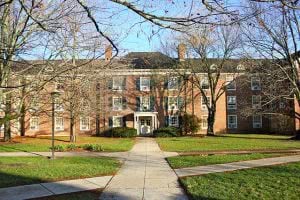
Wikimedia Commons user Theodonc
Location: Oxford, OH
- Student Enrollment: 19,076
- College Type: Public, 4-year or above
Miami University, the 10th oldest public university in the country, was founded in 1809 as the result of an Act of Congress signed by George Washington. Presently, the school offers a diverse 120 undergraduate degree programs, the most popular of which are Finance, Marketing and Accounting.
16. University of Minnesota–Twin Cities
-
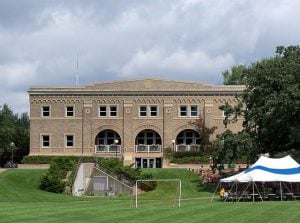
Wikimedia Commons user AlexiusHoratius
Location: Minneapolis, MN
- Student Enrollment: 50,678
- College Type: Public, 4-year or above
Minnesota is a designated Public Ivy, a group of American public universities capable of providing a comparable education to that of an Ivy League school. Though it is the largest college in the Minnesota university system, it has 19 sister campuses scattered throughout the state. In fact, the school is also only three miles away from its St. Paul counterpart.
15. Oberlin College
-
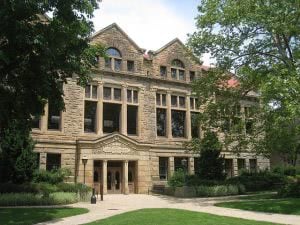
Wikimedia Commons user Daderot
Location: Oberlin, OH
- Student Enrollment: 2,929
- College Type: Private not-for-profit, 4-year or above
Founded in 1833 by John Jay Shipherd and Philo Stewart , Oberlin is the oldest coeducational liberal arts college in the United States. The College of Arts and Sciences offers over 50 majors and minors, the most popular being Music Performance, Biology and Economics. Oberlin has a student to faculty ratio of 9:1 and a four year graduation rate of 76%.
14. St. Olaf College
-
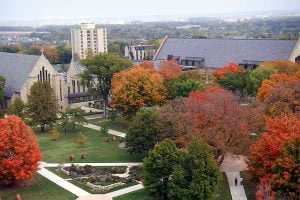
Wikimedia Commons user Daniel Edwins
Location: Northfield, MN
- Student Enrollment: 3,046
- College Type: Private not-for-profit, 4-year or above
St. Olaf is associated with the Evangelical Lutheran Church, and was founded by a group of Norwegian-American immigrant pastors and farmers in 1874. The seal of the university includes the axe of St. Olaf, the school’s namesake and patron saint of Norway. St. Olaf’s scenic campus is 300 acres and is situated next to 325 additional acres of wetlands, woodlands and prairies.
13. Wheaton College (IL)
-
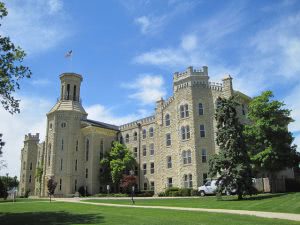
Flickr user Teemu008
Location: Wheaton, IL
- Student Enrollment: 2,929
- College Type: Private not-for-profit, 4-year or above
Established in 1860 to provide excellence in Christian higher education, it is know for its education through a Christian-based worldview. Wheaton offers 40 undergraduate and 14 graduate degrees. Its location of 25 miles west of Chicago provides its students a smaller community close to the amenities of a major U.S. city. The Wheaton Thunder compete in NCAA Division III athletics.
12. University of Wisconsin–Madison
-
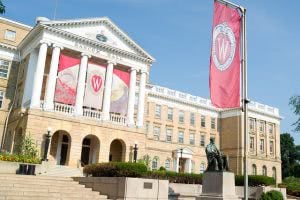
Flickr user Phil Roeder
Location: Madison, WI
- Student Enrollment: 42,716
- College Type: Public, 4-year or above
As Wisconsin’s flagship university, UW is one of the leading research institutions in the Midwest and has been denoted one of the nation’s public Ivy universities. In 2012, it had the 3rd largest research expenditures of all universities in the U.S. in the amount of $1 billion. Regularly known for competitive athletics teams, the Badgers compete in the NCAA Division I Big 10 conference.
-
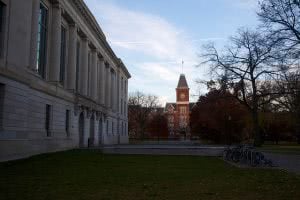
Flickr user Mathieu Thouvenin
Location: Columbus, OH
- Student Enrollment: 58,663
- College Type: Public, 4-year or above
Operating as the third largest university in the U.S., OSU has something for any student and offers over 150 undergraduate majors and over 1,000 student organizations. Psychology, finance and speech rank as its top areas of study. Brutus Buckeye leads OSU’s sporting teams as they compete in NCAA Division I athletics. Buckeyes have won 100 Olympic gold medals.
10. Kenyon College
-
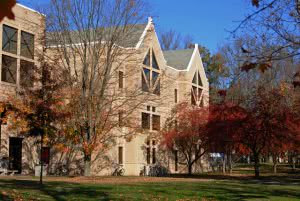
Flickr user Larry Miller
Location: Gambier, OH
- Student Enrollment: 1,711
- College Type: Private not-for-profit, 4-year or above
Close interaction between professors and students is the rule here where instructors become mentors and friends. The Kenyon Review and the Kenyon Institute have supported the College’s distinguished literary history since 1939. While English is the largest major on campus, economics and international/global studies are not far behind. Having won 31 national championships, the Kenyon Lords and Ladies swimming program is the most successful in NCAA history.
-

Flickr user Alan Levine
Location: St. Paul, MN
- Student Enrollment: 2,172
- College Type: Private not-for-profit, 4-year or above
The average ACT score of the incoming freshman class ranges between 28 and 33, for the average SAT scores, between 1280 and 1450. Macalester has a 4-year graduation rate of 85%, and a student to faculty ratio of 10:1. Known as the Scots, Macalester students wear blue and orange to cheer on their sports teams.
8. University of Illinois at Urbana-Champaign
-
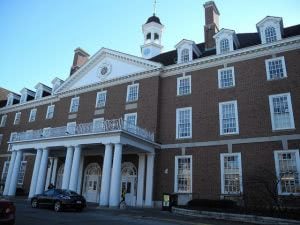
Flickr user Diane Yee
Location: Champaign, IL
- Student Enrollment: 45,842
- College Type: Public, 4-year or above
As one of the original land grant institutions founded in 1867, the University of Illinois operates as a top public research university. Its campus houses the second largest university library in the country as well as home to the fastest supercomputer on a university campus. The University offers over 150 undergraduate and 100 graduate programs with an average ACT between 26 and 32. The Fighting Illini sport bright orange and blue as they compete against other NCAA Division I opponents.
-
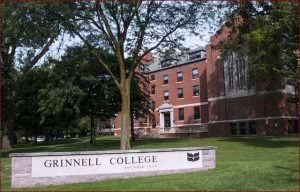
Flickr user Ron Cogswell
Location: Grinnell, IA
- Student Enrollment: 1,705
- College Type: Private not-for-profit, 4-year or above
1846 gave start to this liberal arts college located in the “Jewel of the Prairie”, Grinnell, Iowa. Known for rigorous academics and social responsibility, Grinnell offers 39 majors with 9:1 student faculty ratio. With 75 off-campus study programs, nearly 60% of Grinnellians participate in one of these opportunities. After receiving over 6,400 applications in 2017, only 25% of students were accepted.
-
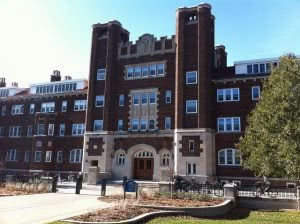
Flickr user Willy Lee
Location: Northfield, MN
- Student Enrollment: 2,014
- College Type: Private not-for-profit, 4-year or above
Average ACT and SAT scores for this college are between 29–34 and 1,310–1,490 respectively. Nearly 7,000 applications come in each year, and of that almost 1,400 are accepted. They wear an eye-catching blue and gold (or maize) colors to cheer on the Knights at their sporting events.
5. University of Michigan–Ann Arbor
-
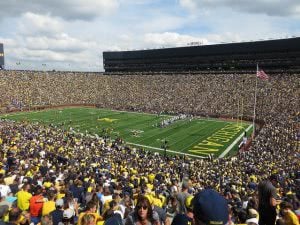
Flickr user Ken Lund
Location: Ann Arbor, MI
- Student Enrollment: 43,651
- College Type: Public, 4-year or above
Originally founded in Detroit in 1817, the public university has expanded over the years to a combined area of over 34 million square feet, which includes its central campus in Ann Arbor, regional campuses in Flint and Dearborn, and an extension center in its original home. Its most popular majors are Business, Economics, Psychology, and Computer and Information Sciences.
4. Washington University in St. Louis
-
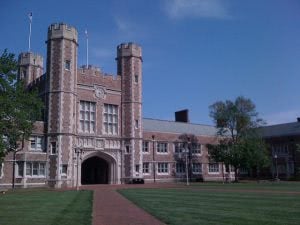
Flickr user grabadonut
Location: St. Louis, MO
- Student Enrollment: 14,688
- College Type: Private not-for-profit, 4-year or above
Of the nearly 15,000 students on campus, the ratio between graduates and undergraduates is relatively even. Top majors at the institution include Psychology, Biology, Finance and Mechanical Engineering. The private research university has also been affiliated with 25 Nobel laureates, nine of which completed the majority of their research at Wash U.
-
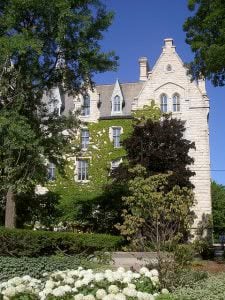
Flickr user jojolae
Location: Evanston, IL
- Student Enrollment: 21,655
- College Type: Private not-for-profit, 4-year or above
Although NU is based in Evanston along the shores of Lake Michigan, the school has two other campuses in Chicago and Doha, Qatar as well as additional facilities in Washington D.C. and San Francisco. The Northwestern Wildcats also compete in 19 varsity sports at the NCAA Division I level as part of the Big Ten Conference.
-
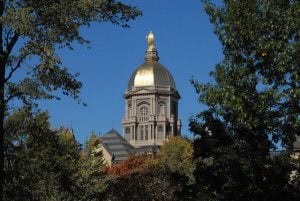
Flickr user Dan Dzurisin
Location: Notre Dame, IN
- Student Enrollment: 12,292
- College Type: Private not-for-profit, 4-year or above
Founded in 1842 by a priest of the Congregation of the Holy Cross, the University of Notre Dame is a widely recognized catholic research university. The most popular majors on campus are finance, accounting, and marketing. With 80% of their students living on campus, most students flock to the athletic stadiums to cheer on their Fighting Irish sporting the famous gold and dark blue uniforms.
-
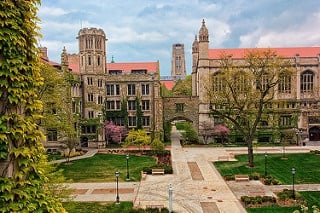
Flickr user Don Burkett
Location: Chicago, IL
- Student Enrollment: 15,391
- College Type: Private not-for-profit, 4-year or above
UChicago has graduated quite a number of recognizable names, including: Roger Ebert, Carl Sagan, Margaret Thatcher, and Indiana Jones (albeit fictionally). Their maroon coat of arms features a phoenix rising towards the words “Crescat Scientia; vita excolatur”—Let knowledge grow from more and more; and so be human life enriched.
About our methodology
Colleges are ranked based on a combination of factors, including graduation rates, campus diversity, endowment per student, and other data as reported via the National Center for Education Statistics (NCES) for the most recently-available enrollment year. Some colleges may have been excluded from rankings based on certain criteria, including specialization and classification. Learn about our full methodology.
Interested in any of these schools? Check out College Raptor’s free match tool to see if they’re a good fit for you!





